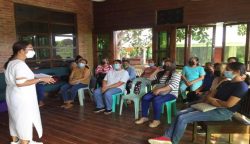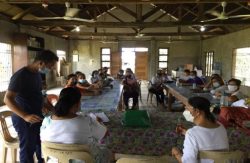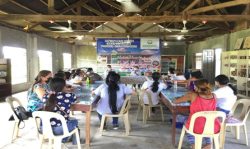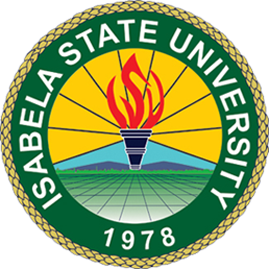 The promotion and adoption of technology does not happen overnight. The technology being promoted must be ripe for adoption for it to warrant its use by its intended adopters. Consequently, the intended adopters must be ready for the technology being promoted.
The promotion and adoption of technology does not happen overnight. The technology being promoted must be ripe for adoption for it to warrant its use by its intended adopters. Consequently, the intended adopters must be ready for the technology being promoted.
Processed tomato food products are rare commodities in commercial establishments. Yet it is a fact that when processed, tomato fruits are more beneficial to the body. Tomatoes abound in localities like the municipality of Roxas in the province of Isabela. These vegetable plants are largely grown in three barangays of the municipality namely, Marcos, San Placido, and Sinamar. Tomatoes abound in the barangays, especially during the peak season of this vegetable plant from April to June, where its price may dip down to as low as 2.00 pesos per kilo.
The birth of an innovation or technology is sometimes usually driven by the presence and abundance of raw materials in certain localities as in case of the tomato jam project of the Marcos Tomato Livelihood Association or MARTOLA. MARTOLA was one of the thriving associations in Roxas, Isabela when Isabela State University (ISU) together with Singapore Polytechnic (SP) were searching for organized groups to work with in the fourth leg of the Learning Express (LeX) Program. LeX is a joint project of SP and ISU that is aimed at helping associations discover their pressing problems and through Design Thinking find innovative solutions to these problems. It was through the LeX Programme that ISU came to know about MARTOLA in 2017.
MARTOLA was organized by the Local Government Unit (LGU) of Roxas, through the Municipal Social Welfare Development Office (MSWDO). Because the barangay had excess tomato harvests, the LGU requested the Department of Science and Technology (DOST) to train the members of MARTOLA to produce tomato jam. The same tomato jam product of MARTOLA was one of the projects scoped for the LeX program where 15 female active members of the association was part of the project that looked into the possibility of improving the processes and the output of the tomato jam project. Back in Singapore after the LeX Program, some SP students together with food technologists of the polytechnic developed a new tomato jam formulation.
In October 2018, the Learning Express Plus (LeX+), another SP-ISU collaborative project, introduced the new tomato jam formulation to some faculty of the Hotel and Restaurant Management (HRM) program and some LeX alumni of ISU Cabagan campus. The ISUC group made the formulation more Filipino and together, SP and ISUC passed on the new tomato jam to MARTOLA. To date, the development of an improved tomato jam formulation may be claimed to have been undertaken by SP, ISUC and the Department of Science and Technology (DOST) Regional Office 02.
In 2019, other tomato food products were developed as a result of the collaboration between ISU and SP. These were introduced to MARTOLA and other women leaders in the nearby tomato-producing barangays, namely San Placido and Sinamar. The activities likewise included concerns in packaging, promotions, and marketing. One drawback that was discovered during this year was the stoppage of production due to the high price of tomatoes during off-season. So practically, six out of the twelve months of the year saw no production of tomato food products. The years, 2018 and early part of 2019 saw the implementation of the Phase 1 of this project. The ISUC faculty extensionists from the College of Development Communication and Arts and Sciences (CDCAS) and the Institute of Business Management (IBM) initially worked with the members of the MARTOLA.
With an increase of interest in the tomato food products in the nearby barangays, the collaborating agencies advised the women to form a new association thus, in 2019, the Roxas West Ladies Tomato Industry or RoxWeLTI was born. This brought the membership of the association to 100 female members where 50 are from Marcos and 25 members each from San Placido and Sinamar. Production activities carried out in May to July 2020, where bulk of tomatoes were bought at a very low price, saw eight active members from Marcos, 14 from Sinamar and six from San Placido making the adopters of the tomato food products technology to 28 (Please refer to attached list). It was during this time that mid-processed tomato food products were produced. These products came in the form of tomato puree, dried tomatoes, and tomato concentrate. These products were stored according to desired temperature and storage protocols and when production activities are carried out these are processed into desired appropriate tomato food products like jam, tomato salt powder, tomato candy, tomato juice, tomato chutney, and dried tomatoes in olive oil.
Another challenge faced by an association that is trying to engage in a micro business enterprise is to meet government regulations and standard to assure the consuming public of the safety of its products. The first step was to apply for the license to operate or the LTO of the tomato processing center based at the Bahay Bahaginan, Core Shelter, Marcos, Roxas, Isabela. This was collaboratively worked-out by the Bahaginan sa Roxas, Inc., the Local Government Unit of Roxas, Isabela and the Isabela State University Cabagan Campus. The requirements which included training, business registration, laboratory tests of sample tomato food products were worked out by ISUC together with the LGU and NGO. The establishment and improvement of the physical structures and meeting the specific requirements of the Department of Science and Technology (DOST) and Food and Drugs Administration (FDA) pertaining to water quality, ventilation, sanitation was largely the work of the NGO and the LGU with technical support from ISUC.
In February 2020, the tomato processing center was evaluated by the FDA. As a result of the evaluation, the association was required to submit the original tomato food products (jam, salt and tomato rings) for another round of laboratory tests. The results of the tests were submitted to FDA and finally, after almost two years of working out the license, the tomato processing center was granted its license to operate in August 2020. The above issues and concerns that beset the project then were the concerns taken up in the Phase 2 of the proposal.
A new and bigger association like RoxWeLTI with a promising business venture deserves to be provided with continuous support and intervention especially so when its products have the potential for commercialization and when it has the strong support of its Local Government Unit (LGU); a local Non-Government Organization (NGO) that is willing to provide the structures and materials needed in production; line agencies of government for technical and equipment support and an international academic institution like SP for technical and financial support.
The implementation of the Phase 3 of this project may see a more stable and functional business enterprise for the women that is operational not only at the local level, meaning municipal level but may grow into a business that will be known at the provincial, regional, national and even international level. This may very well fulfill the provision on women empowerment as stipulated in R.A. 9710, the Magna Carta for Women. For this project, it entails providing the women additional income through their manufacturing activities involving processed tomato food products so that they can also support their own personal needs. Clearly, through the project, the members of RoxWeLTI will get to learn new skills, socialize with their fellow women leaders and ultimately gain the self confidence that rightfully belong to them.
At the macro-level, this project may satisfy three of the United Nations Sustainable Development Goals (SDG) as follows: SDG 2: Zero Hunger. Processing excess tomatoes when these are very cheap in the market is a new way to reduce food wastage through food product development. This undertaking in itself extends the shelf life of raw tomatoes; SDG 8: Decent Work and Economic Growth. The project envisions a micro-scale, though robust community-based entrepreneurial activity for ladies to bring additional income to support their families; and SDG 12: Responsible Consumption and Production. The production of local food products for the local community translates to reducing carbon footprint of product before reaching consumers (sdgs.un.org/goals).
View Full Terminal Report: Tomato Talk




